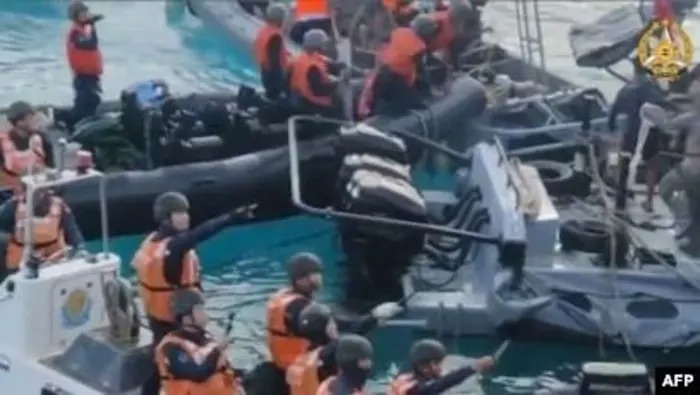Advertisements
President Marcos Asserts Philippines’ Resolve in South China Sea Dispute

Philippines’ Commitment to Peaceful Resolution
In a firm yet peaceful stance, the President of the Philippines, Ferdinand Marcos Jr., declared on Sunday that the nation would not back down to “any foreign power” following a violent clash between Filipino navy personnel and the Chinese Coast Guard. Despite the tension, Marcos emphasized that the Philippines would never instigate a war.
The incident occurred in the disputed South China Sea, where Chinese forces injured Filipino navy personnel and damaged two military boats using machetes, axes, and hammers. This confrontation is the latest in a series of encounters highlighting the escalating tensions in the region.
A Presidential Visit to Palawan
President Marcos flew to Palawan, a western island province facing the South China Sea, to personally meet and award medals to the navy personnel involved in the confrontation. The mission was intended to deliver food and supplies to an outpost on the contested Second Thomas Shoal.
Advertisements
Videos and photos released by the military depict a chaotic faceoff, with Chinese coast guard personnel attacking a Philippine navy boat and seizing a bag while using sirens and blinding strobe lights. The Chinese government defended its actions, claiming the Filipino forces ignored warnings and entered what China considers its territory—a claim refuted by international arbitrators and rival claimant governments.
International Reaction
The violent clash has drawn widespread condemnation and concern from the United States, the European Union, Japan, Australia, and other Western and Asian nations. Both China and the Philippines have blamed each other for the incident. However, Marcos’s administration has clarified that it does not plan to invoke the mutual defense treaty with the United States in response to this event.
Marcos reassured Filipino forces, stating, “We are not in the business to instigate wars. In defending the nation, we stay true to our Filipino nature that we would like to settle all these issues peacefully.” He praised the navy personnel for their restraint, noting their deliberate choice to remain peaceful despite intense provocation.
The Incident at Second Thomas Shoal
During the clash at the shoal, Filipino navy special operations personnel resorted to using their bare hands to push back the Chinese, who pointed knives at them. Philippine military chief Gen. Romeo Brawner Jr. reported that the Filipino forces exhibited remarkable restraint and composure.
Marcos reiterated the nation’s stance, “We stand firm. Our calm and peaceful disposition should not be mistaken for acquiescence. History itself can tell that we have never, never in the history of the Philippines yielded to any foreign power.”
China’s Response and Ongoing Tensions
Chinese officials in Manila and Beijing have yet to comment on Marcos’s remarks. Meanwhile, the President commended the 80 officers and personnel involved in the supply mission, including one who lost his right thumb during the confrontation. He encouraged them to continue defending the nation with integrity and respect.
The South China Sea territorial disputes, involving China, the Philippines, Vietnam, Malaysia, Brunei, and Taiwan, remain a volatile issue. The potential for conflict has raised concerns about a possible confrontation between the U.S. and China if incidents at sea escalate into armed conflict. Washington has repeatedly affirmed its commitment to defending the Philippines, its oldest treaty ally in Asia, should Filipino forces be attacked in the South China Sea.
Looking Ahead
The recent clash underscores the complex and delicate nature of the South China Sea disputes. As nations navigate these turbulent waters, the Philippines’ commitment to peaceful resolution stands as a testament to its diplomatic approach, even in the face of aggression.

